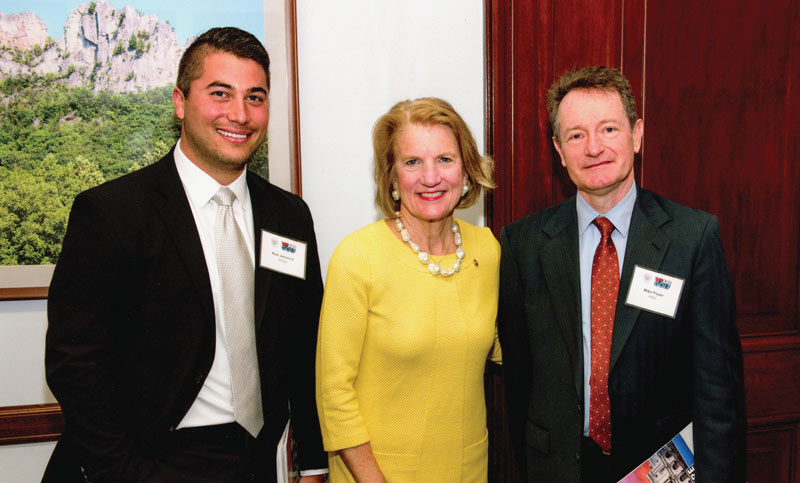
GCSAA Class A superintendent Nick Janovich (left) with U.S. Sen. Shelley Moore Capito and Mike Pieper, a lobbyist for Ping Golf, on National Golf Day 2017. Photo courtesy of Nick Janovich
Grassroots Ambassador Academy was held once again at the Golf Industry Show, and several new faces were in the audience in San Antonio, all eager to hone their advocacy skills. Many attendees had not yet participated in a congressional meeting, and were looking for tips and tricks for a smooth first experience. I’ve been a grassroots ambassador since 2014, and was part of a panel on hand to offer insight during the event. Throughout the four-hour session, a common theme emerged: persistence.
Most seasoned ambassadors have made some type of contact with their assigned member of Congress. For some, though, securing a meeting can be challenging. Requests for a legislator’s time are obviously plentiful and sometimes not initially answered, so persistence and determination are critical for success as a grassroots ambassador.
A legislator’s district staff is sometimes more available (and closer) for an ambassador to connect with. Though their time is limited as well, staff on Capitol Hill are also open to meeting with ambassadors. All of these staff members have the ear of the legislator, and they’ll typically pass along any important notes from their meetings. Productive meetings with such contacts are thus one of the best ways to influence policy. To make the most of what are often quick appointments, having a clear and concise agenda is necessary, and the GCSAA government affairs team works to provide ambassadors with the education and resources to achieve that.
An established and successful relationship with a congressional staffer can eventually lead to a meeting with the member of Congress, or even a site visit. Because of the relationship-based nature of government, advocacy cannot be a thoughtless or one-time endeavor. As in any good relationship, the effort must be sustained and thorough.
I recently visited Capitol Hill for a full day of meetings. (My assigned member of Congress as a grassroots ambassador is Rep. David McKinley of West Virginia’s 1st District, but I’ve also worked with Sens. Shelley Moore Capito and Joe Manchin of West Virginia.) Upon my arrival in one legislator’s office, a staffer proclaimed, “Hey, you’re the golf guy!” It was an innocent comment, and I laughed it off. When I thought back on it later, though, it became rather meaningful. After all, that is the goal.
While grassroots ambassadors’ aim is to work toward practical legislation, we also want to become a resource for legislators when they’re facing decisions that may impact the golf industry. We need every congressional office to have a “golf guy” to turn to for input on how pending legislation will affect those back in the district. That can only be accomplished through consistent and meaningful (and oftentimes hard-won) meetings that communicate golf’s economic value and our commitment to sustainable and environmentally friendly management of our facilities.
April 25 is National Golf Day, when golf groups will converge on Washington, D.C., to advocate on behalf of the industry. GCSAA’s delegation is made up of superintendents excited to tell their stories and help shape legislation, and thanks to the association’s government affairs team, our delegation is the largest and best organized of the coalition. That bodes well for a successful event, because no one can tell golf’s story quite like those of us who live it daily. Superintendents have firsthand experience with and extensive knowledge of the most significant issues facing the industry. We are the preeminent voice of golf on Capitol Hill every day, and National Golf Day is no exception.
I urge you to attend National Golf Day. The event is open to all GCSAA members, and you can find all the details and register on the We Are Golf website. Not only is National Golf Day an excellent professional-development experience, but it will give you the opportunity to tell our industry’s greatest success stories. Given golf’s nearly $70 billion economic impact, 2 million jobs and almost $4 billion in charitable contributions, our story is an easy one to tell. By becoming a resource for policymakers and their staff members, you can help shape legislation that will impact our industry for years to come. Don’t sit back and expect others to advocate on your behalf — now is the perfect time to step up and make a difference.
Nick Janovich is the golf course superintendent at Oglebay Resort in Wheeling, W.Va., and an 11-year member of GCSAA.